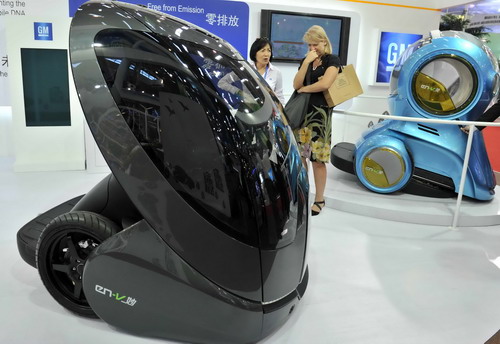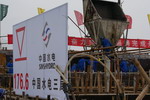Eco-cities are the key to conservation
Updated: 2011-09-24 09:08
By Li Xiang and Xu Zheng (China Daily)
|
|||||||||||
|
Visitors to the Second China (Binhai Tianjin) International Eco-City Forum and Expo on Friday look at a concept vehicle displayed by General Motors. [Photo / Xinhua] |
TIANJIN - Ecological city planning and construction will play a crucial role in energy saving and emission reduction as well as low-carbon industry, as half of the global population live in cities that use 70 percent of the world's energy.
That was the message at the opening ceremony of the Second China (Binhai Tianjin) International Eco-City Forum and Expo on Sept 23.
"The eco-city must be the direction of urban development for the future. The world's cities, a critical symbol of modern civilizations, hold half of the world's population. These residential hotspots consume 70 percent of the world's energy, produce 75 percent of waste and emit 80 percent of the carbon dioxide", said Ablet Abdureshit, vice-chairman of the Chinese People's Political Consultative Conference, who announced the opening of the grand event.
The carbon dioxide emissions of 287 small cities in China accounts for 72.6 percent of the nation's total. The top 100 cities ranked by GDP are responsible for 51.7 percent of those emissions, according to Niu Wenyuan, chief scientist and leader of the sustainable development strategy research group under the Chinese Academy of Sciences.
Eco-cities will be a huge breakthrough in energy conservation, emissions reduction, and the low-carbon industry. Cities can be the pioneers in abandoning obsolete developmental strategies and the "high input, high consumption, and high pollution" model, he said.
Eero Kalervo Paloheimo, an internationally known ecologist, said China can become a leader in eco-city development.
"All the different branches of industry need renewal. New kinds of traffic, energy production and recycling technologies are needed. The long period of industrialization in the West has created dependence, which is not easy to resolve. It is apparently easier for China to make deep, general and radical changes to the structures of production," he said.
"China and Singapore had decided to build the Sino-Singaporean eco-city in Tianjin, the first of its kind in the world. Now, not only the planning, but also the construction is under way. For a Westerner, it's amazing."
Paloheimo expressed his faith in the Tianjin Binhai New Area.
"I have no doubt that the project, as an eco-city standard-setter, is a great step toward a new era. It will absolutely be a tourist attraction for designers from Europe and the United States".
Zong Guoying, head of the Tianjin Binhai New Area, said: "The Second China (Binhai Tianjin) International Eco-City Forum and Expo will lead in-depth and profound discussions based on hot subjects, including the development of eco-cities, global cooperation, ecological finance policies, and low-carbon development and standardization, to explore innovative approaches and strategies to build eco-cities".
- 'Debt crises offer chances'
- Giant Interactive to invest $50m in Alibaba
- Super rice needs time to go commercial
- State tweaks resource tax on oil, gas producers
- China to revise environmental quality standards
- Car-free campaign falls flat
- AstraZeneca relies on partners
- Hurun shows property is still key to riches














